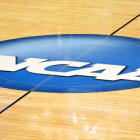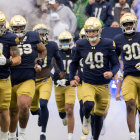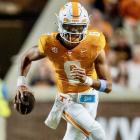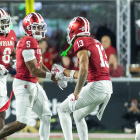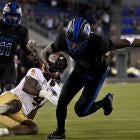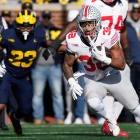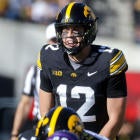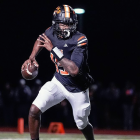Welcome to a reset of college athletics.
No, not just college basketball in the wake of the Justice Department's seemingly ever-widening investigation, revealed Tuesday, into the sport's culture.
Not even just college football, whose athletes still have to wait three years to turn pro and -- for the most part – cannot yet be monetized when they're in eighth grade.
No, this should be a reset for the whole enterprise. We have to hit the button and start over from here because, in its totality, the corruption scandal that was revealed Tuesday by the United States Attorney's Office is -- and under current rules will always be -- out of the reach of the NCAA.
Some folks are going to jail, not just being blackballed with a show cause penalty.
This isn't a postseason ban, this is saying goodbye to your wife and kids for a few years.
This isn't just losing your job, this is having your lunch served through a slit in your cell door.
How's that for branding college athletics, Mark Emmert?
We -- media, administrators, some fans -- all knew some form of the graft that was alleged Tuesday has been going on for years. If a college basketball program could get just one guy, it could turn things around. Same for an apparel company.
We just couldn't prove it.
The Justice Department has laid it out in excruciating detail.
"For the defendants charged today, the madness of college basketball went well beyond March," U.S. Attorney Joon Kim said.
This scandal is bigger than Miami, USC, Ohio State, Louisville, Baylor, pretty much anything you can think of in recent memory. (We leave out Penn State because wrongdoers were accused, tried and convicted of crimes against humanity. The NCAA's subsequent overreach in penalizing the school was outside even the association's enforcement arm.)
Those schools were single entities. This is college athletics on trial. There's not a damn thing the NCAA can do about it except piggy back the government's investigation and apply its own penalties.
In the end, the most compelling piece is the government investigating crimes, not the NCAA nit-picking a rule book.
Yes, college athletes needs a reboot. The last time there was a criminal investigation this big, the NCAA enforcement division was being created.
In the early 1950s, a massive point-shaving scandal involved 33 players allegedly fixing 86 games at seven schools in 17 states.
It was out of that mess the NCAA instituted the enforcement staff that polices things today. The message then from then-executive director Walter Byers might as well be used now: If fans can't trust the legitimacy of the games they're watching, what's the point?
That's where we are again, 65 years later.
"We don't have enough transparency," said Lynn Lashbrook, a Portland, Oregon, sports management consultant. "Checks and balances have eroded. It's an ethical compass. Your mom taught you right and wrong. We've lost that ethical compass."
Lashbrook has been a college coach, scout, compliance director, athletic director and agent in a career that has spanned more than 30 years.
"As an agent, I've watched how difficult it is to get in the room [for a basketball player]. It's a closed circuit," he said. "Basketball is the most vulnerable, but it would be very naïve to think this isn't the tip of the iceberg."
What you saw Tuesday was the Justice Department's Chapter 1 of "War and Peace." There is much more to come from the feds. They didn't spend all this time and money to indict four assistant coaches and arrest 10 people.
We already know from the record that they coerced a financial adviser to roll on suspected coaches.
We're not talking about hardened criminals here. We're talking about white-collar money launderers who preyed on teenagers.
They're likely to do anything to save their asses.
There will be those who call for players to be paid. You know, over the table. There is no amount of money that can root out the culture that has been established in college basketball.
If they all get $10,000, then why not $20,000? The shoe companies can always match. That sort of economy started with Sonny Vaccaro and Nike and Michael Jordan in the 1980s. Since then, the culture went underground and started a new illegal economy.
College football is headed the same way. The insidious third parties referenced by the feds on Tuesday are a growing culture in college football.
The three top shoe companies (Nike, Adidas and Under Armour) effectively control the seven-on-seven circuit. Because of modern offenses, one or two players -- like basketball -- can change the fortunes of a football team, too.
Like basketball, skill players are being targeted as high school freshmen or earlier. This summer, I watched a group of wide-eyed grade-school and high school athletes who had paid $1,500 to participate in a weekend football quarterback camp. For the money, they got instruction from some of college football's most well-known quarterbacks and at least one rookie pro.
That wasn't the surprise. It's what was on the sidelines -- a marketer from a major apparel company and a high-powered NFL agent -- that raised questions.
What was an NFL agent doing there if not to troll for future clients?
The one significant firewall is that three years in residence requirement before turning pro. Basketball's one-and-done rule is little more than a required waiting room before going to the NBA.
Byers himself saw the conflict later in life. He advocated for an NCAA "open division" where players could be compensated.
"I don't think the fabric of higher education as we believe in it and would like to see it function in this country can stand the strain of big-time intercollegiate athletics and maintain its integrity," Byers told Sports Illustrated before his death two years ago.
Summing it up, FBI assistant director in charge Bill Sweeney said Tuesday, "We have a lot more work to do,"
He then provided a phone number to call for those who know of more federal crimes. Behind him was an assistant named "Capone."
When was the last time you heard any of that in college athletics scandal?







